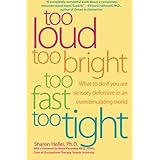Posts Tagged ‘Sharon Heller’
 “Super Sensitive Smell.” – Doc Meek
“Super Sensitive Smell.” – Doc Meek
Today I am grateful for people who are very sensitive and for those who help them, like Sharon Heller, expert and author. – Doc Meek  Image from: 123rf.com
Image from: 123rf.com
Super Sensitive Smell
My first experience with super senses came when I first started my private practice at THE LEARNING CLINIC, several decades ago now.
A young boy was brought in by his mother, who was worried about his problems at school and at home. She introduced me to Jackson (not his real name) and asked me to speak with him about school.
Jackson and his Mom were seated about 6 feet away from me in my office.
“Hi Jackson,” I ventured softly. “Can you tell me something that you are good at?”
Silence.
“Maybe you could share with your Mom and me something that you like? Anything. Not just at school. OK?”
Silence
Surprise for Doc Meek (and Mom!)
Mom encouraged Jackson to speak up: “Doc is kindly and gentle, son, and will listen respectfully to what you say, no matter what.”
“Your breath stinks,” ventured Jackson, holding his nose. (Remember that Jackson was 6 feet away from me.)
Mom’s face reddened and she was about to expostulate…
I said, “It’s OK, Mom.”
“It’s OK, Jackson. You are just letting me know what you don’t like and that’s good.”
HSP (Hypersensitive Person)
I recalled my earlier reading about HSP (hypersensitive person), or in plain English: Highly Sensitive People).
Jackson, encouraged, ventured again:
“Your wall clock is so noisy I can’t hear you and Mom real good.”
Neither Mom nor I could hear the wall clock tick.
Thus began my fortunate face-to-face education about HSP (Highly Sensitive People). Of which, more later.
For details on these kinds of learning problems, see the delightful book by Sharon Heller (2003), too loud, too bright, too fast, too tight, available online at Amazon.com and elsewhere:

Too Loud, Too Bright, Too Fast, Too Tight: What to Do If You Are Sensory Defensive in an Overstimulating World… by Sharon Heller (Dec 2, 2003)
Thank you, Sharon Heller!
Dialing down the ticking clock
I did not know how to help Jackson with the super smell at the time.
I did know how to try to help with the super hearing.
Using concrete examples such as turning down the volume on a radio, we taught Jackson’s brain how to mentally dial down the volume of items that were distracting him in everyday life.
We had Jackson imagine a picture of radio volume dial out in front of him and and we had him reach out with his hand and turn the volume dial down.
This was not sufficient.
Finally the idea came of hooking up an imaginary small motor with a belt pulley attached to the volume control dial.
As the motor spins the volume dial down “endlessly,” the brain is able to dial down distracting sounds (such as a ticking clock, or tinnitus).
“Magic.” 😮
Doc Meek, South Jordan, Utah, USA, Sept 10, 2014
………………………………………………………………………………………………….
P.S. Highly Sensitive Granddaughter
Years later, the memory of Jackson came back to me when I was walking by a brick building with my granddaughter Katie (not her real name).
Suddenly (“for no reason”) she clapped her hands firmly over her ears.
“What’s happened?” I asked as we walked further away.
“Those pipes are so noisy,” she advised Grandpa, whose hearing is not perfect she knew.
Turns out that two “silent” exhaust pipes were softly “whooshing” air from an unheard fan highly distant from the pipe exit.
“Good luck, little girl,” I whispered inside my head. “I’m glad we know better now how to help you manage better.” ………………………………………………………………………………………………….